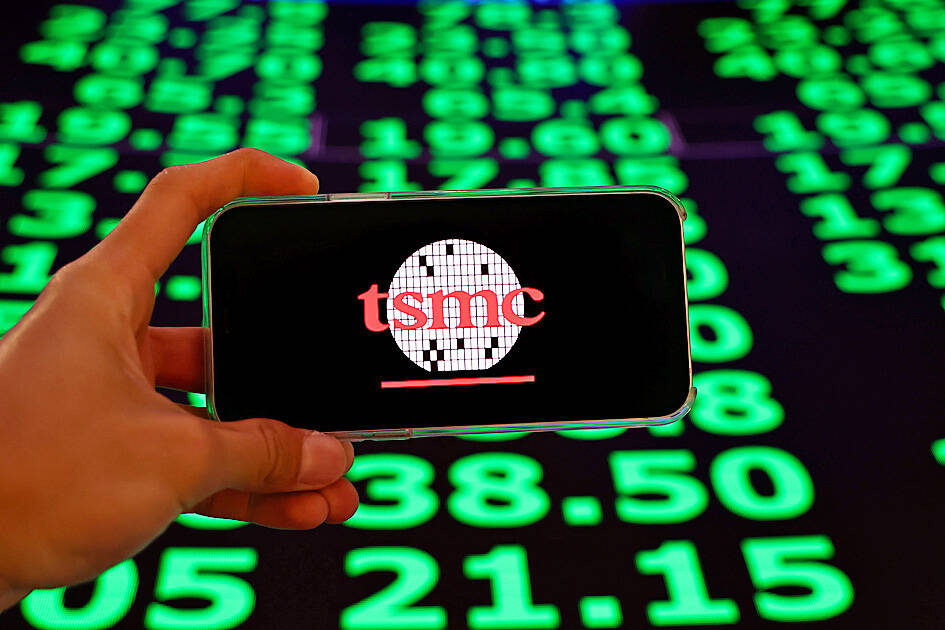Taiwanese stocks plunged more than 340 points yesterday following the three-day Dragon Boat Festival holiday, as renewed fears over US’ trade policies rattled investor confidence after US President Donald Trump’s on Friday said that China had breached a preliminary trade deal with Washington, and announced double tariffs on steel and aluminum imports to 50 percent.
Trump’s remarks were followed by US Secretary of Commerce Howard Lutnick critizing Beijing for its slow implementation of the deal — an agreement that had previously lifted market sentiment and raised hopes for a durable easing of tensions between the world’s two largest economies.
The Chinese Ministry of Commerce said in a statement yesterday that Washington is making “bogus charges” and has “unreasonably accused China of violating the consensus, which is seriously contrary to the facts.”

Photo: CNA
The TAIEX closed down 344.59 points, or 1.61 percent, at 21,002.71, with total turnover reaching NT$344.76 billion (US$11.50 billion), Taiwan Stock Exchange data showed.
The market opened 0.44 percent lower, and losses increased throughout the session, driven by heavy selling in the bellwether electronics sector, in particular among large-cap semiconductor stocks.
Investor sentiment remained subdued amid concerns sparked by Trump’s accusation.
“Global markets remained focused on the tariff issue,” Cathay Futures Consultant Co (國泰證期) analyst Tsai Ming-han (蔡明翰) said. “Now, Trump’s comments raised concerns over trade frictions between the top two economies.”
“In Taiwan, investors remain alert over a possible tariff on semiconductors, and that’s why chip stocks came under heavier pressure throughout the session,” Tsai said.
Contract chipmaker Taiwan Semiconductor Manufacturing Co (TSMC, 台積電), the most heavily weighted local stock, fell 2.17 percent to close at the day’s low of NT$946, while smartphone IC designer MediaTek Inc (聯發科) appeared more resilient, ending unchanged at NT$1,260.
Also in the electronics sector, iPhone assembler and artificial intelligence (AI) server maker Hon Hai Precision Industry Co (鴻海精密) lost 2.24 percent to close at NT$152.5, and Quanta Computer Inc (廣達電腦), another AI server supplier, dropped 0.18 percent to end at NT$271.
“The TAIEX fell below the technical support of the 20-day moving average around 22,815 points today, meaning the local main board has became technically weaker,” Tsai said. “As long as the tariff issue remains in place, investors should stay cautious.”
Elsewhere in Asia, most markets sank yesterday as investors brushed off data released on Friday showing the US Federal Reserve’s favored inflation gauge cooled more than expected last month.
Hong Kong, Tokyo, Sydney, Singapore, Mumbai and Jakarta fell along with London, Paris and Frankfurt.
Seoul and Manila were marginally higher, while Shanghai was closed for a holiday.
Additional reporting by AFP

Sweeping policy changes under US Secretary of Health and Human Services Robert F. Kennedy Jr are having a chilling effect on vaccine makers as anti-vaccine rhetoric has turned into concrete changes in inoculation schedules and recommendations, investors and executives said. The administration of US President Donald Trump has in the past year upended vaccine recommendations, with the country last month ending its longstanding guidance that all children receive inoculations against flu, hepatitis A and other diseases. The unprecedented changes have led to diminished vaccine usage, hurt the investment case for some biotechs, and created a drag that would likely dent revenues and

Global semiconductor stocks advanced yesterday, as comments by Nvidia Corp chief executive officer Jensen Huang (黃仁勳) at Davos, Switzerland, helped reinforce investor enthusiasm for artificial intelligence (AI). Samsung Electronics Co gained as much as 5 percent to an all-time high, helping drive South Korea’s benchmark KOSPI above 5,000 for the first time. That came after the Philadelphia Semiconductor Index rose more than 3 percent to a fresh record on Wednesday, with a boost from Nvidia. The gains came amid broad risk-on trade after US President Donald Trump withdrew his threat of tariffs on some European nations over backing for Greenland. Huang further

CULPRITS: Factors that affected the slip included falling global crude oil prices, wait-and-see consumer attitudes due to US tariffs and a different Lunar New Year holiday schedule Taiwan’s retail sales ended a nine-year growth streak last year, slipping 0.2 percent from a year earlier as uncertainty over US tariff policies affected demand for durable goods, data released on Friday by the Ministry of Economic Affairs showed. Last year’s retail sales totaled NT$4.84 trillion (US$153.27 billion), down about NT$9.5 billion, or 0.2 percent, from 2024. Despite the decline, the figure was still the second-highest annual sales total on record. Ministry statistics department deputy head Chen Yu-fang (陳玉芳) said sales of cars, motorcycles and related products, which accounted for 17.4 percent of total retail rales last year, fell NT$68.1 billion, or

HSBC Bank Taiwan Ltd (匯豐台灣商銀) and the Taiwan High Prosecutors Office recently signed a memorandum of understanding (MOU) to enhance cooperation on the suspicious transaction analysis mechanism. This landmark agreement makes HSBC the first foreign bank in Taiwan to establish such a partnership with the High Prosecutors Office, underscoring its commitment to active anti-fraud initiatives, financial inclusion, and the “Treating Customers Fairly” principle. Through this deep public-private collaboration, both parties aim to co-create a secure financial ecosystem via early warning detection and precise fraud prevention technologies. At the signing ceremony, HSBC Taiwan CEO and head of banking Adam Chen (陳志堅)